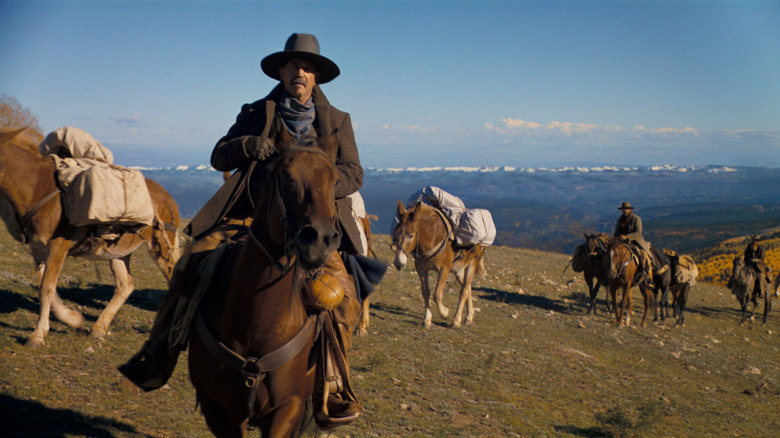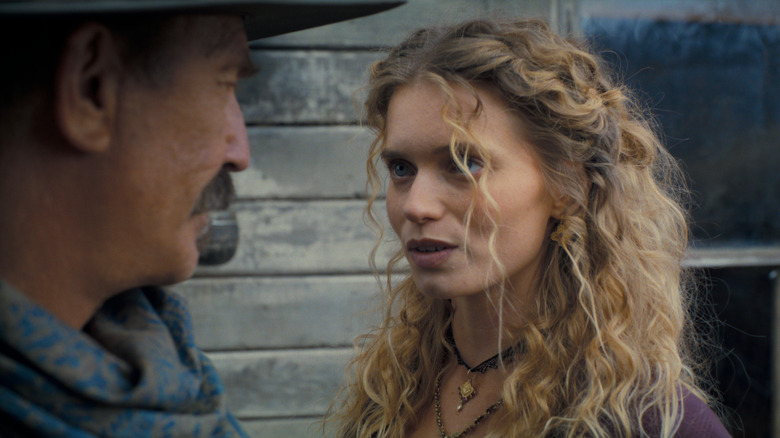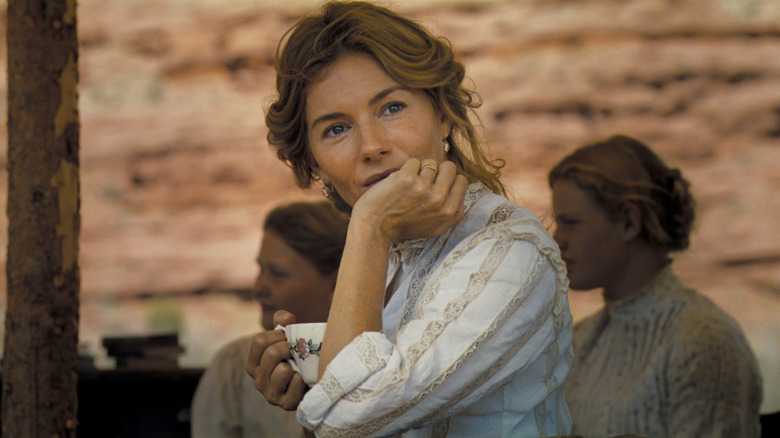Horizon: An American Saga - Chapter 1 Review: The Most Expensive Trailer For A Sequel Ever Made
In the more than 20 years that have passed since Kevin Costner last stood behind the camera and delivered his third feature as a director, 2003's well-received "Open Range," a lot has changed within the studio system. For one thing, there are fewer independent studios in operation these days compared to the turn of the century, when the very idea of Disney absorbing 20th Century Fox in a hostile takeover or Paramount Pictures desperately seeking a merger would've felt laughable. For another, the advent of streaming has completely upended the status quo, transforming bravura spectacles crafted specifically for theaters — even one directed by the legendary Francis Ford Coppola — into an exception rather than the rule. And, of course, ever-volatile moviegoer habits combined with a once-in-a-generation pandemic have further convinced industry bigwigs to embrace risk-averse strategies, spurning auteur-driven passion projects in favor of the safer shores of superheroes and other franchises.
But you'd hardly even know any of that had transpired over the past two decades by looking at "Horizon: An American Saga – Chapter 1," Costner's ambitious and almost obstinately throwback Western billed as the first of four total installments. (The second, essentially shot back-to-back with "Chapter 1," is due to arrive later this August.) From the opening moments bursting with sweeping landscape shots, Civil War-era settlers hard at work, and composer John Debney's blaring score worthy of Ennio Morricone himself, the sheer high of seeing countless actors and extras filmed on actual sets and dwarfed by the stunning vistas surrounding them is enough to carry even the most skeptical viewers through the first hour and change of table-setting in this three-hour epic ... during which, notably, Costner never appears as his rugged cowboy hero Hayes Ellison. From such an unconventional structure to the intimidating size of this ensemble to the relative lack of action to the lengthy runtime itself, it's as if the mere existence of this film represents a middle finger to the almighty algorithms of the Netflix's, Apple TV+'s, and (amusingly enough, for a Warner Bros. release), Max's of the world.
If the best thing to be said about "Horizon" is that it feels airlifted from another period of Hollywood history entirely, however, then its most debilitating flaw is that there's so little emotional substance to hold onto throughout — and I can't emphasize this enough — all three plodding hours of this event film. Deliberate and restrained to a fault, "Chapter 1" is caught between its own sense of grandeur and the oddly impersonal stakes of its sprawling story. Ultimately, despite the evocative filmmaking constantly on display, this franchise-starter ends up stumbling right out of the gate, hoping that the promise of a more exciting sequel can make up for a lackluster beginning.
Horizon is too much setup for too little payoff
For all its faults, that "Horizon" exists at all in its present form feels like a minor miracle and an undeniable win among those starving for adult-minded, genuinely thought-provoking original offerings. If that comes across like damning with faint praise, consider that this refreshing Western is the exact antithesis of all the generic studio-noted, focus-grouped, and cookie-cutter blockbusters us movie nerds complain about on the regular. That said, this unfocused and thinly-stretched version of the film can't help but sag beneath the weight of its own unwieldiness.
The script, co-written by Kevin Costner and first-time scribe Jon Baird, takes an awkwardly episodic approach in the early stages and never quite seems sure of what to do with its very, very deep bench of character actors. We're introduced to multiple groups of individuals all spread out in different locales of 1859 America, some of whom eventually factor into the story while others wind up little more than window dressing. In one corner, a homesteader's mistress named Ellen (Jena Malone) shoots her abusive partner and flees from Montana to make a new start, incurring the wrath of his conniving sons Junior (Jon Beavers) and Caleb Sykes (Jamie Campbell Bower). Elsewhere, Costner's Hayes Ellison and local courtesan Marigold (Abbey Lee) cross paths and wind up ont the run from the villainous Sykes brothers in a rare instance of one subplot intersecting another. Finally, we check in on a wagon train making its way through the Sante Fe trail, featuring Will Patton, Luke Wilson, Isabelle Fuhrman, and Ella Hunt. (Familiar faces Danny Huston, Michael Rooker, Giovanni Ribisi, Jeff Fahey, and Dale Dickey also appear in what amounts to cameos.)
The only unifying factor between these threads, if there is one, revolves around the idyllic promise of Horizon plastered on several pamphlets spread out in the Old West. This town takes centerstage for the film's standout action set piece, set off when Apache warriors led by young hothead Pionsenay (Owen Crow Shoe) attack in a fiery extended sequence that's thrilling and stomach-churning in equal measure. After the ash and smoke settle, it's clear the ruined settlement symbolizes an ideal more than a place, a multifaceted reflection of the country's blue-collar pioneering spirit ... but one that's also stained by the bloodied hands that stole Indigenous lands away from those who lived here long before. To his credit, Costner tries to contextualize the optics of making a yee-haw cowboy picture at a time when the general public has never been more cognizant of this nation's colonial foundations. Unfortunately, when they're not being depicted as bloodthirsty savages from the perspective of white settlers (which is all too often), the Native cast are shortchanged by the director's unwillingness to spend enough time in one place to fully explore their concerns before moving on to the next.
The impending sequel may be better positioned to delve into the unsightly muck of how the West was "won," but that only leaves "Chapter 1" with the bitter aftertaste of too much setup for too little payoff.
Horizon probably should've been a television show
As a movie, "Horizon" has an inordinately difficult time connecting its many moving parts into a cohesive whole, an issue that could've likely been averted had Costner and his creative team recognized that this story called for an entirely different medium altogether. As a series taking inspiration from Costner's own "Yellowstone" show, ironically, it's easy to imagine all the various beats and themes coming together as distinct, well-rounded units with the benefit of individual hours focusing on specific protagonists at a time. Instead, audiences are expected to navigate what seems like a never-ending series of character introductions for roughly the first hour or so, barely even getting our feet underneath us before constantly resetting and getting whisked away to another unrelated story beat. Although that might paint a picture of a frenetic and fast-paced narrative, "Horizon" settles into a purposeful rhythm that lingers on several shots and moments with a rarely-seen display of patience — courtesy of J. Michael Muro's unobtrusive cinematography, whose camerawork constantly gets out of its own way to let the spectacular visuals do all the talking — but one that soon borders on tedium.
What's most disappointing is that this inability to live up to its grand ambitions comes at the cost of its greatest strength. With Costner appearing in "Horizon" for a shockingly short amount of time, the unexpected (but bold) choice helps make this vanity project feel a little less vain; although a late moment of rather unconvincing intimacy feels a bit indulgent, likely providing more ammo to the "Sex scenes aren't necessary" brigade at the same time, sadly. In his frequent absence, it's up to Sam Worthington's Army Lieutenant Trent Gephart and Sienna Miller's Frances Kittredge, a newly-single mom and survivor of the Horizon attack, to provide much of the narrative and emotional backbone. Luckily, both are up to the task ... even as it feels criminal to waste so many heavy-hitters in one talented ensemble, all of whom would've been better served in a more nimble prestige series that gave them room to breathe.
Make no mistake, an overt John Ford and Sergio Leone sendup with a subtitle like "An American Saga" will never be accused of subtlety, but the film's last misstep undoes any nuance Costner might've been aiming for. As if painstakingly moving characters around like pieces on a chessboard didn't put too fine a point on it, the final few minutes ends with a montage that acts as a literal trailer for the next movie, putting several of its characters in closer proximity to one another than they ever were in the prior three hours. As a self-contained and satisfying yarn, this initial attempt at original franchise-building leaves a whole lot to be desired. As the most expensive feature-length trailer ever made, "Horizon" sets the stage for a much more interesting sequel where, hopefully, something of import actually happens.
/Film Rating: 5 out of 10
"Horizon: An American Saga – Chapter 1" releases in theaters June 28, 2024.


